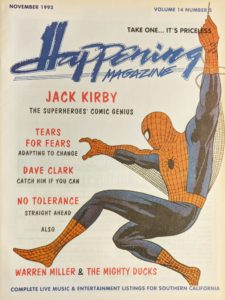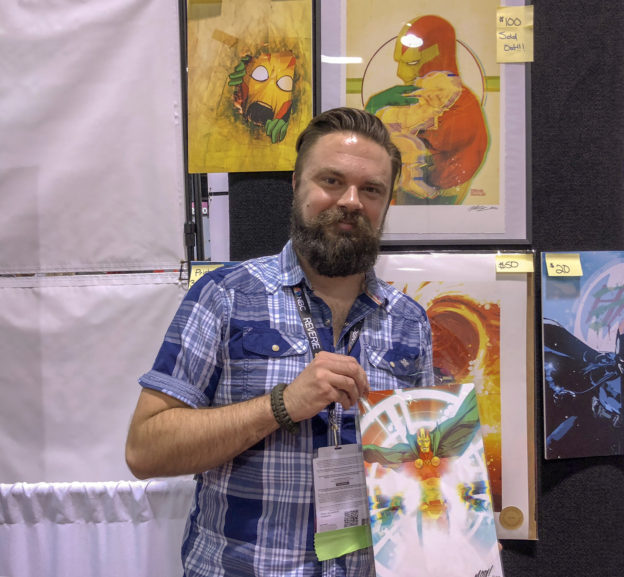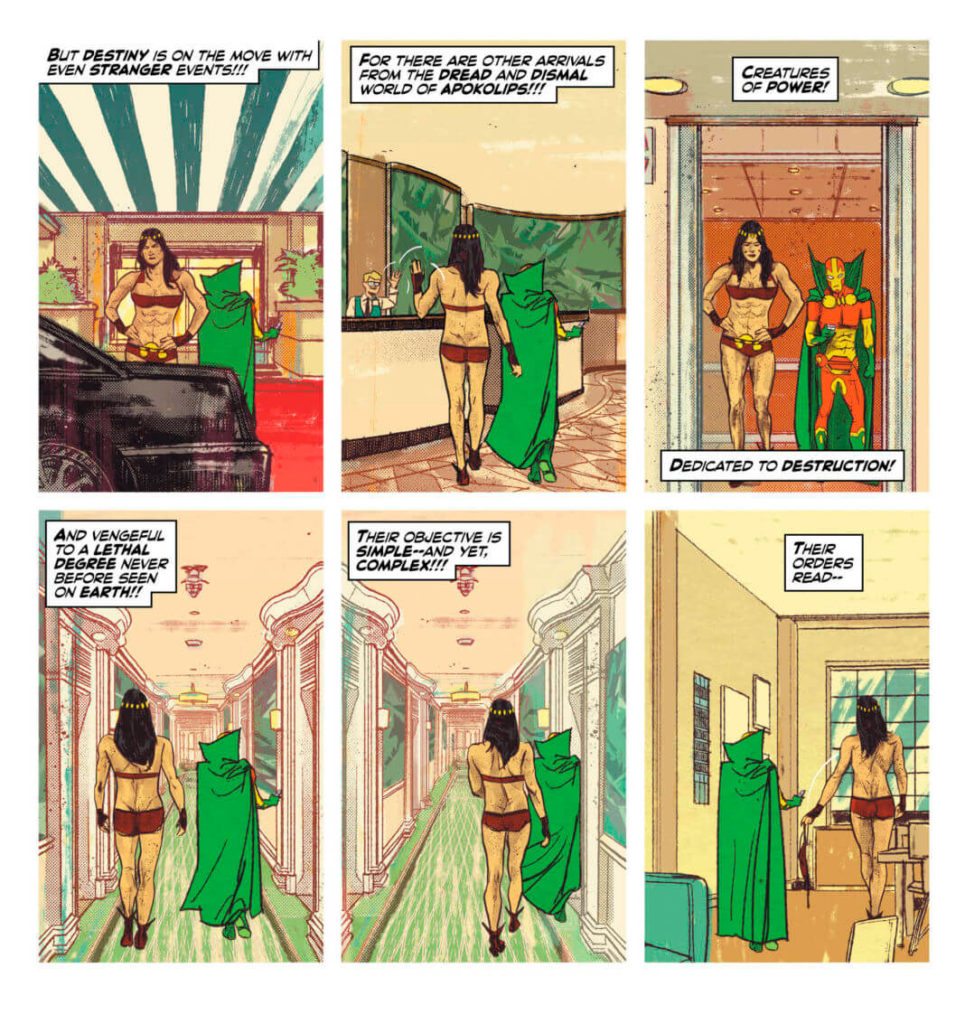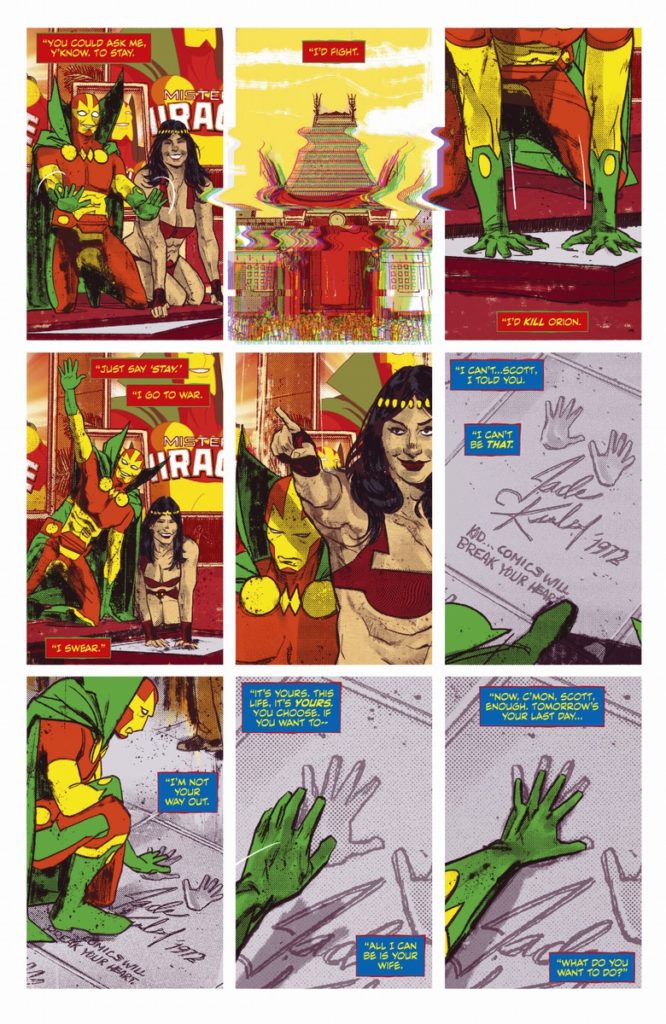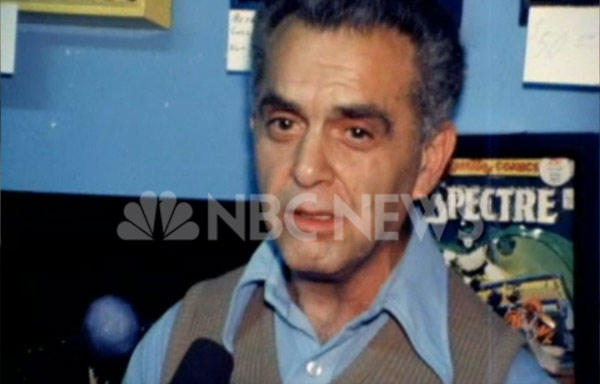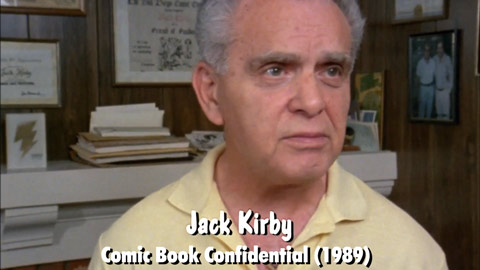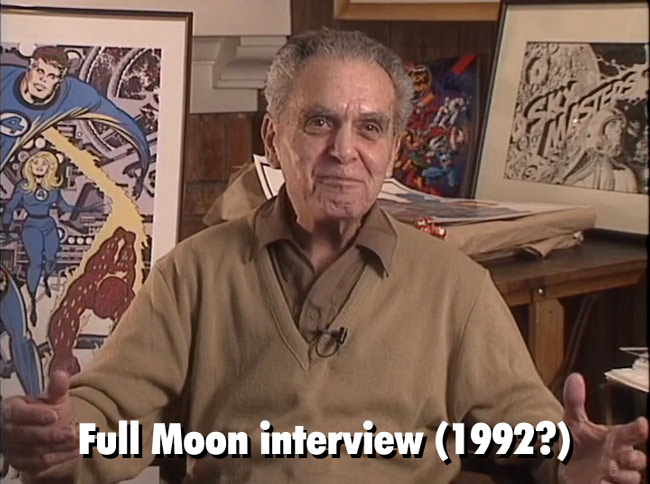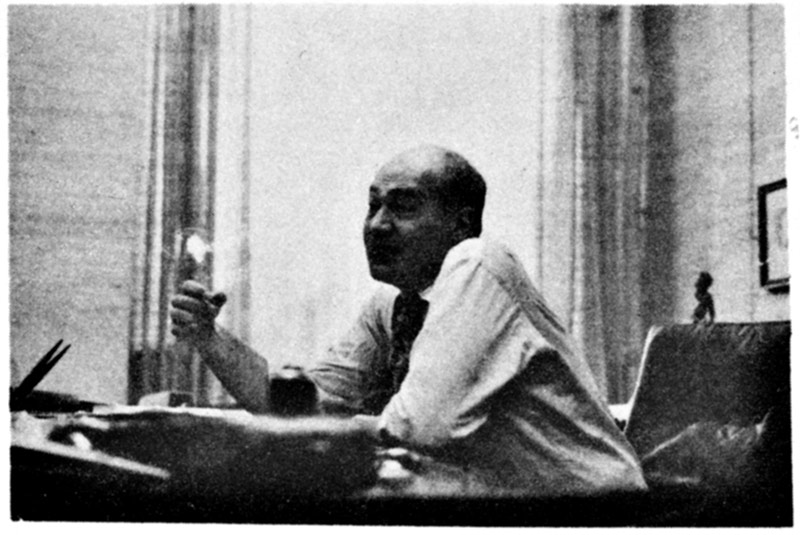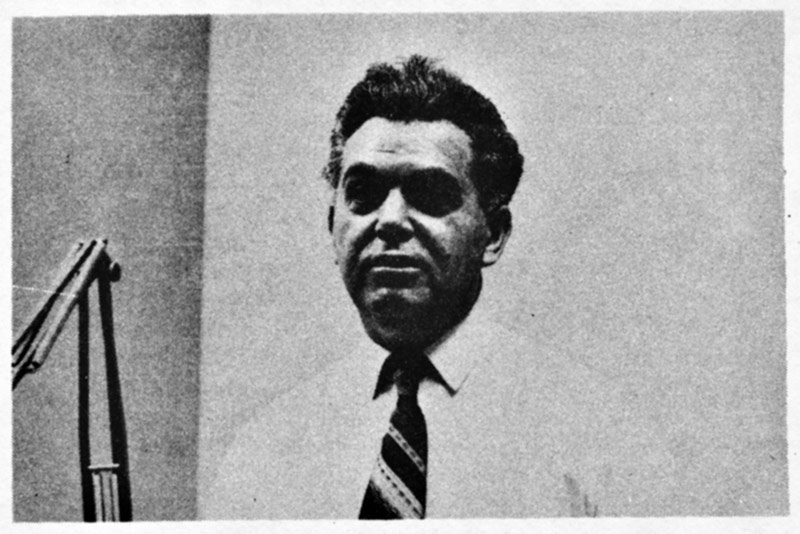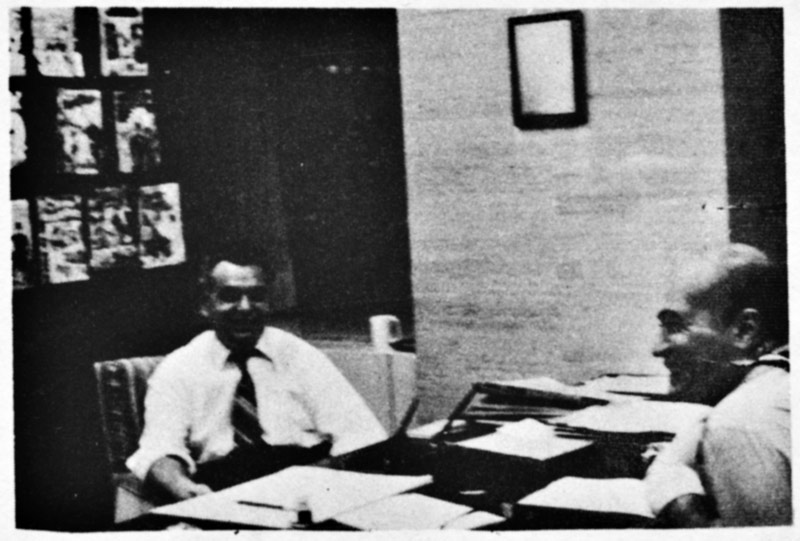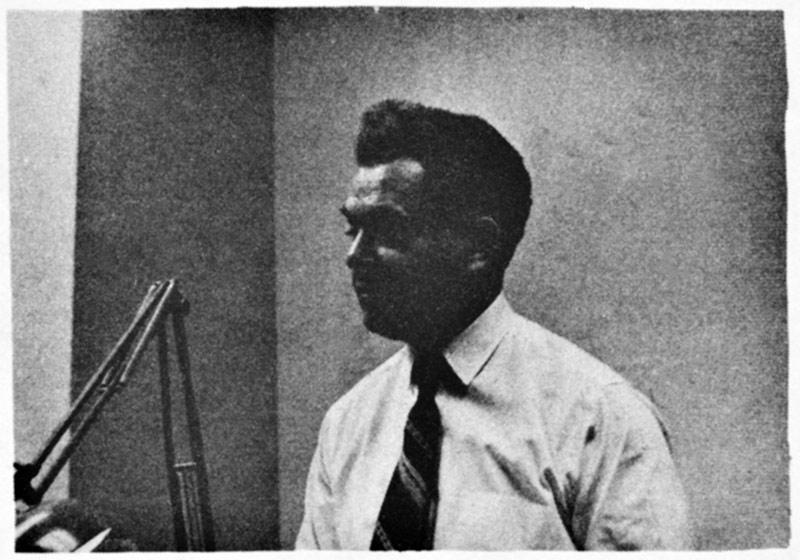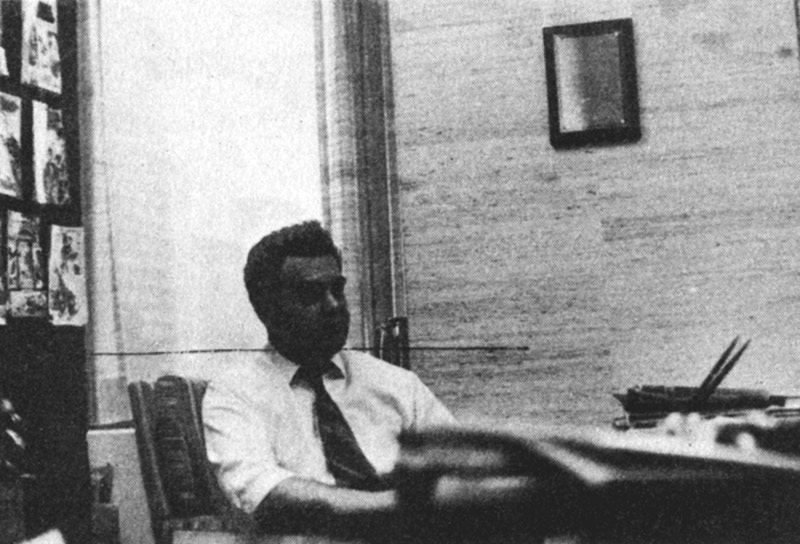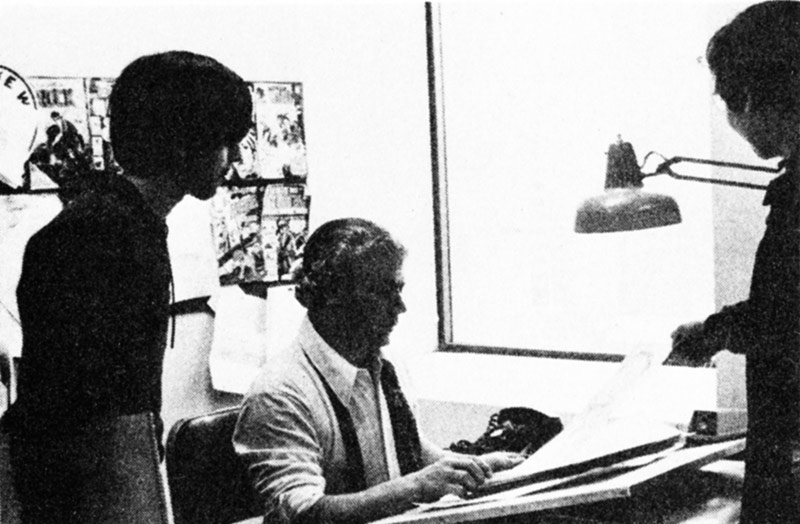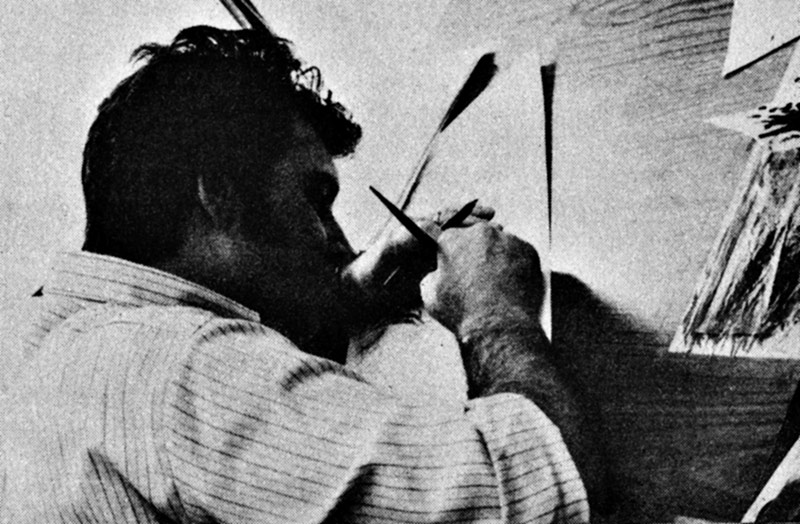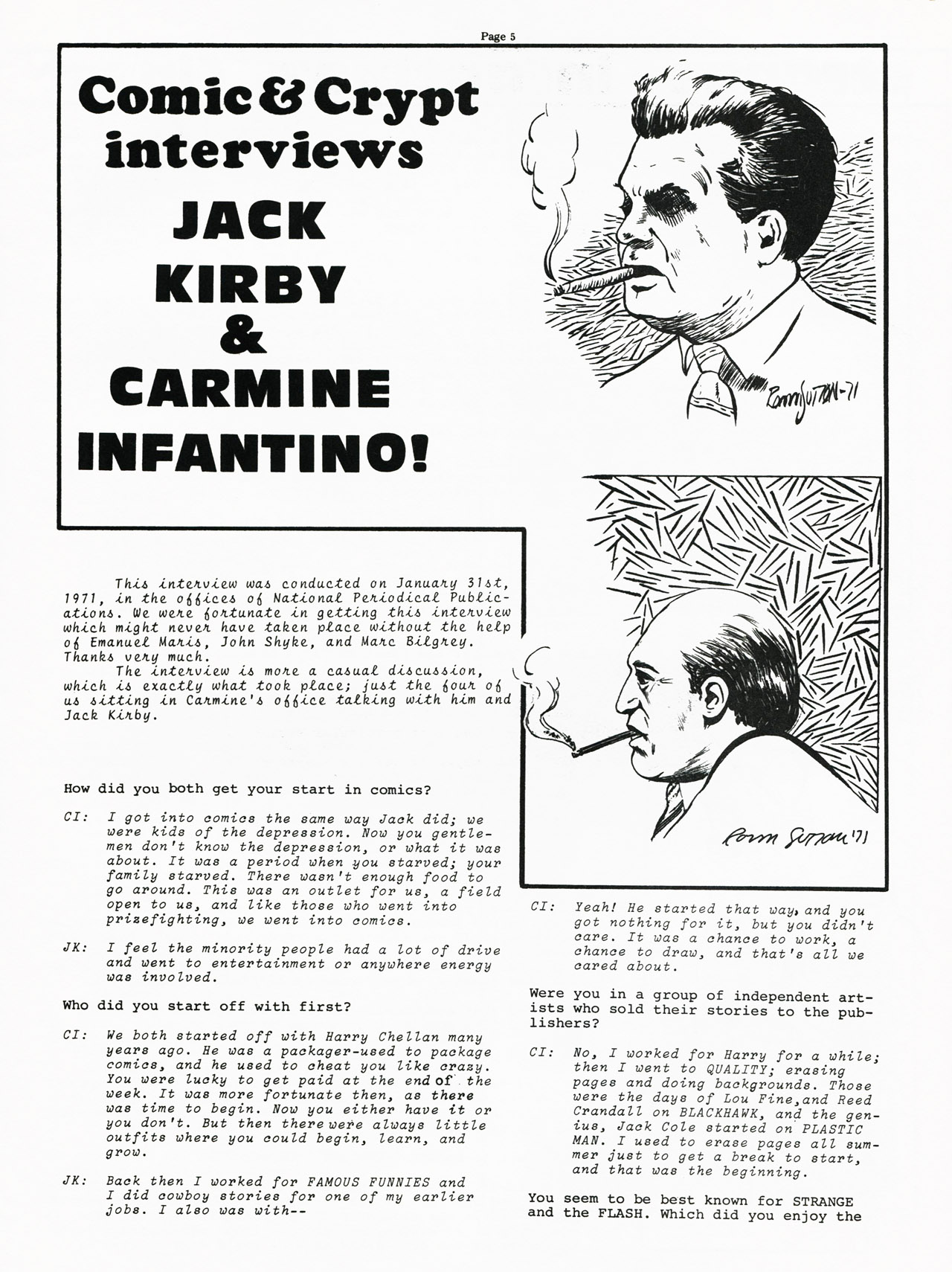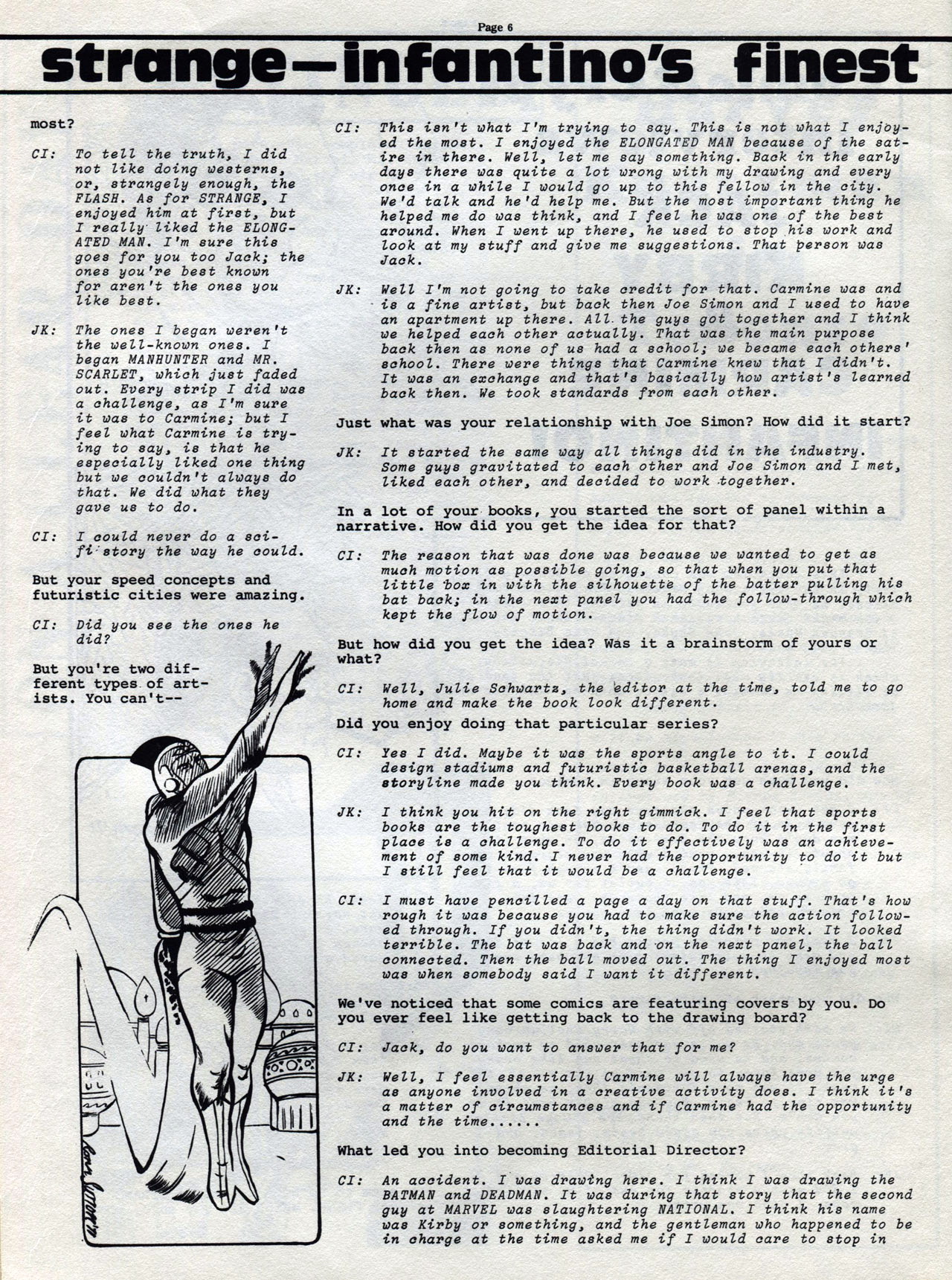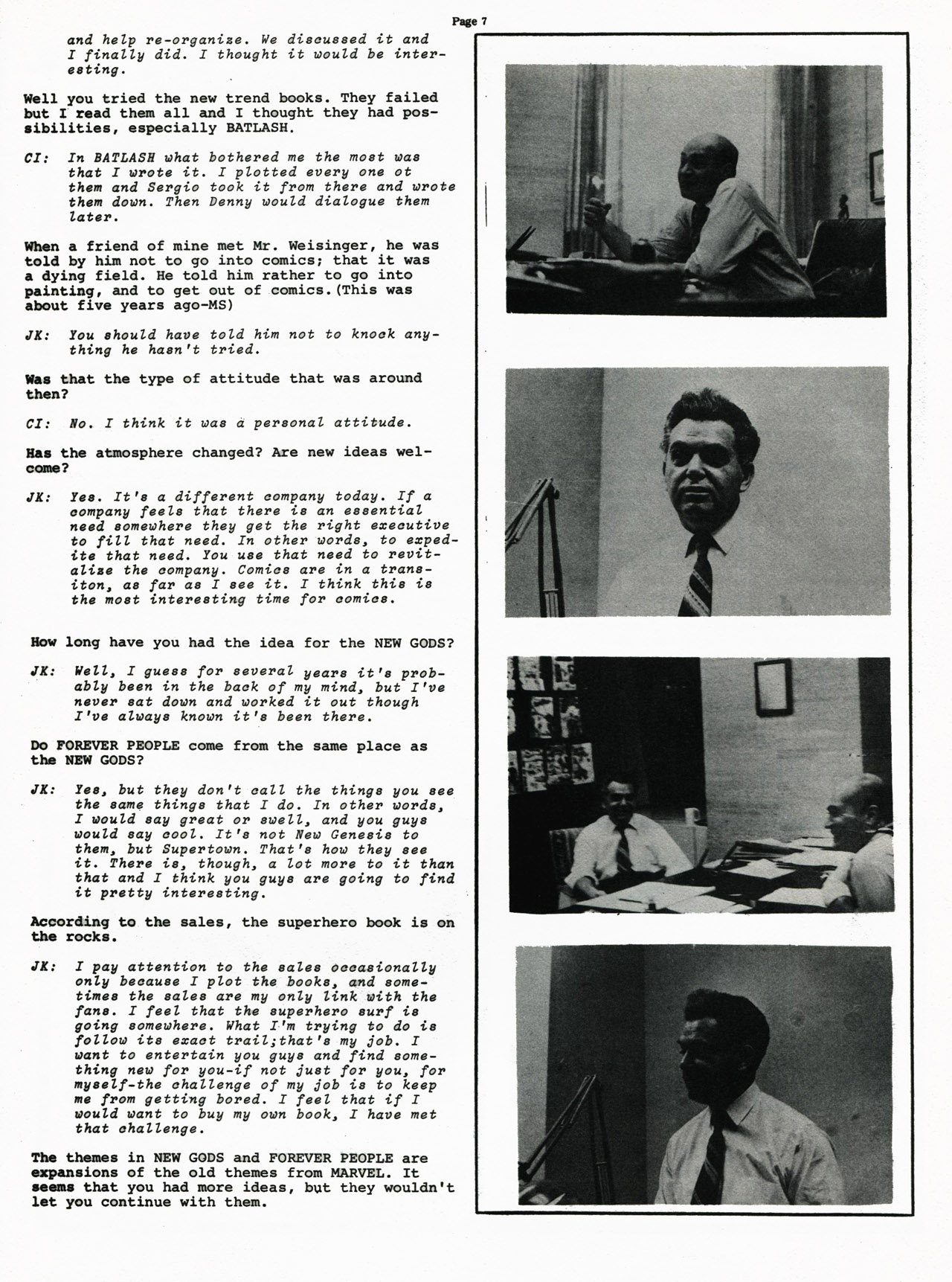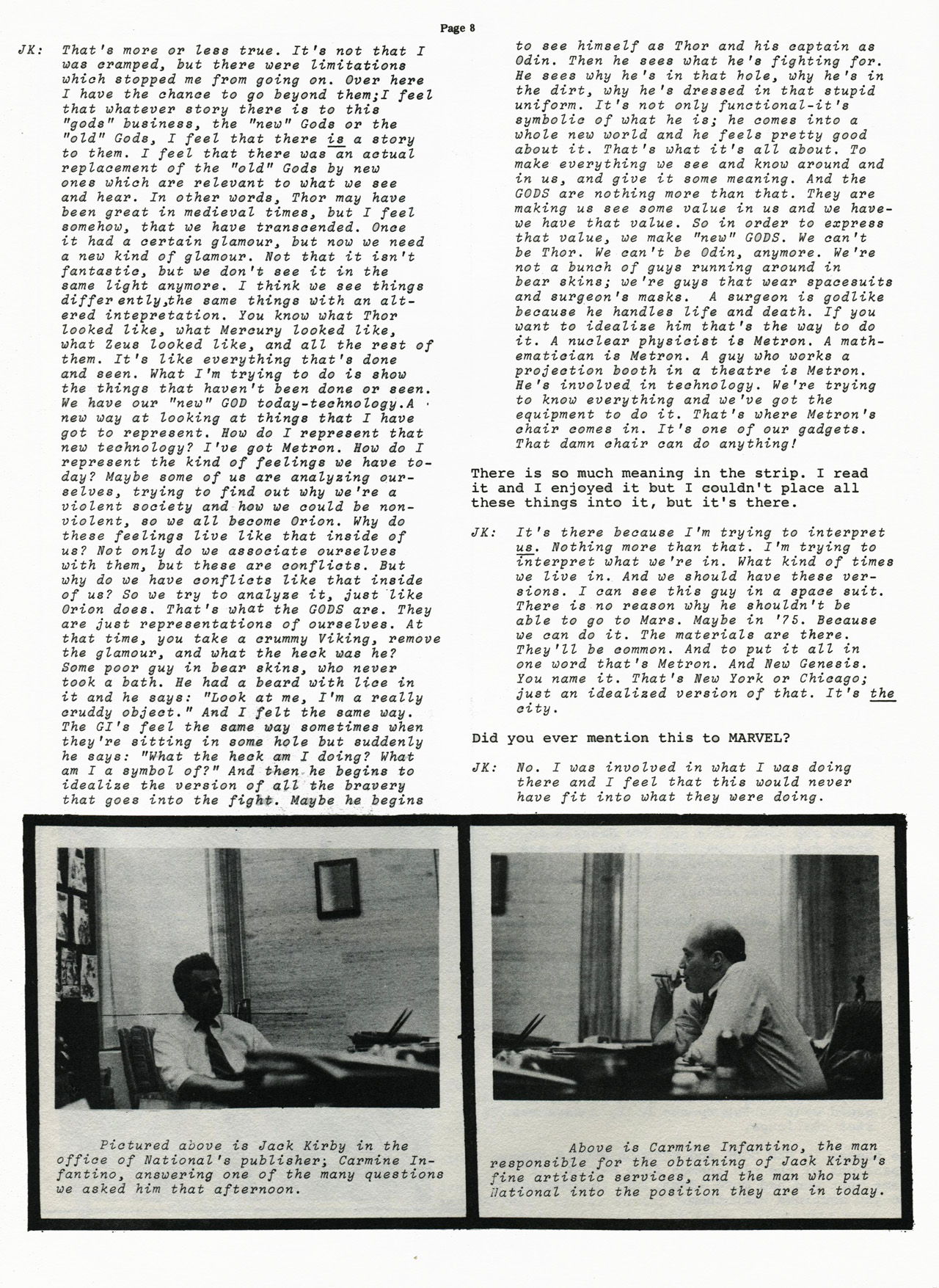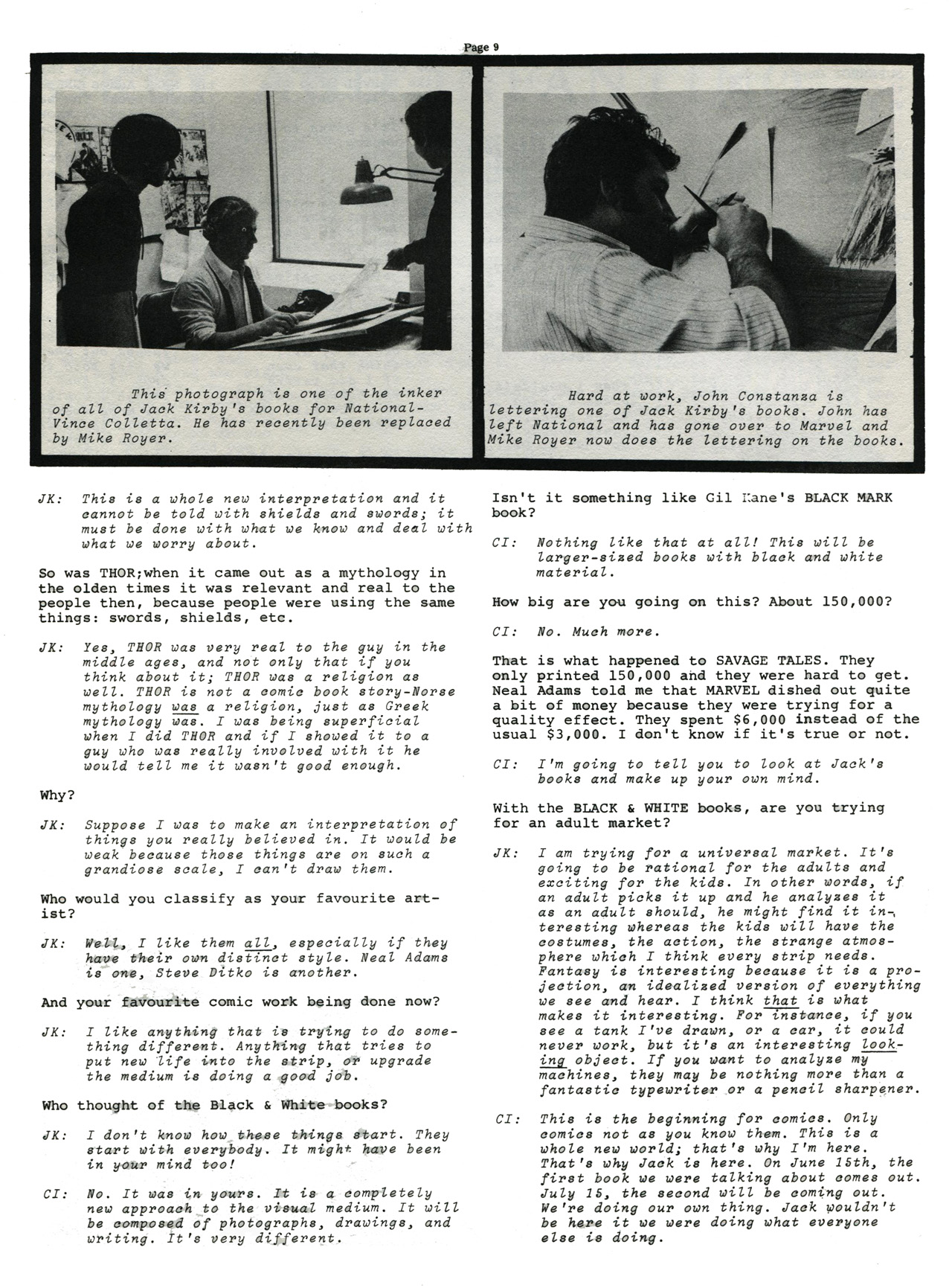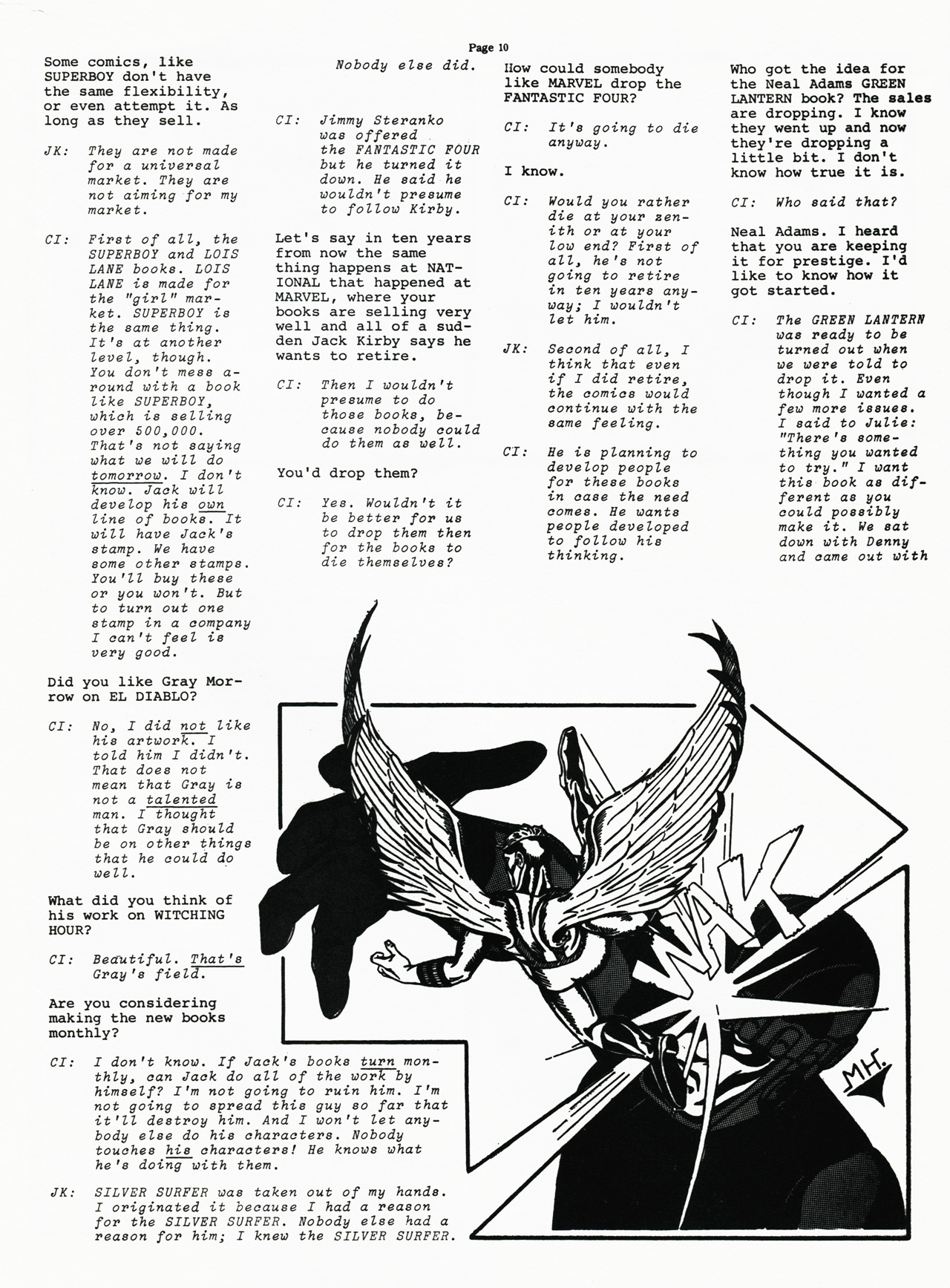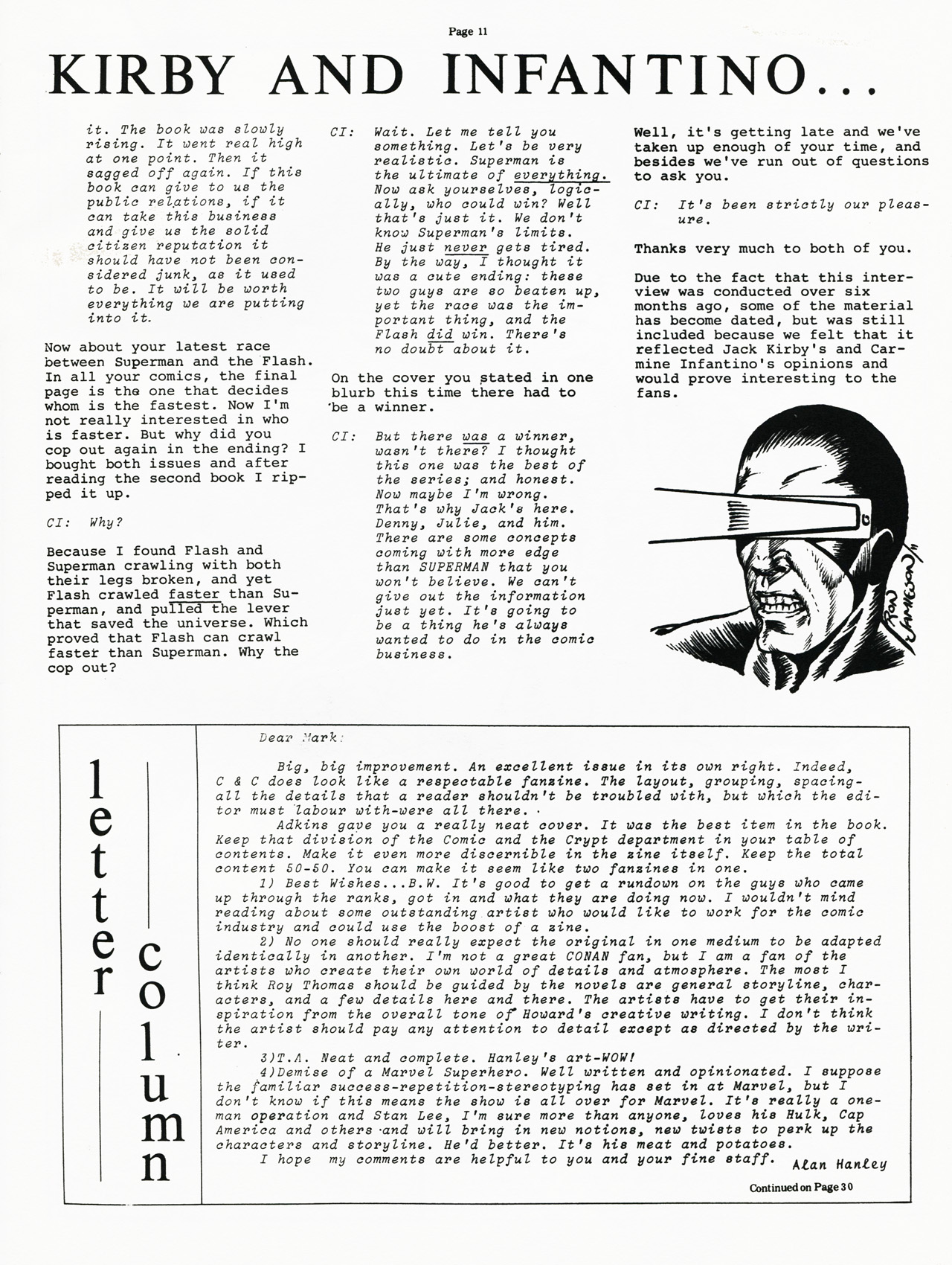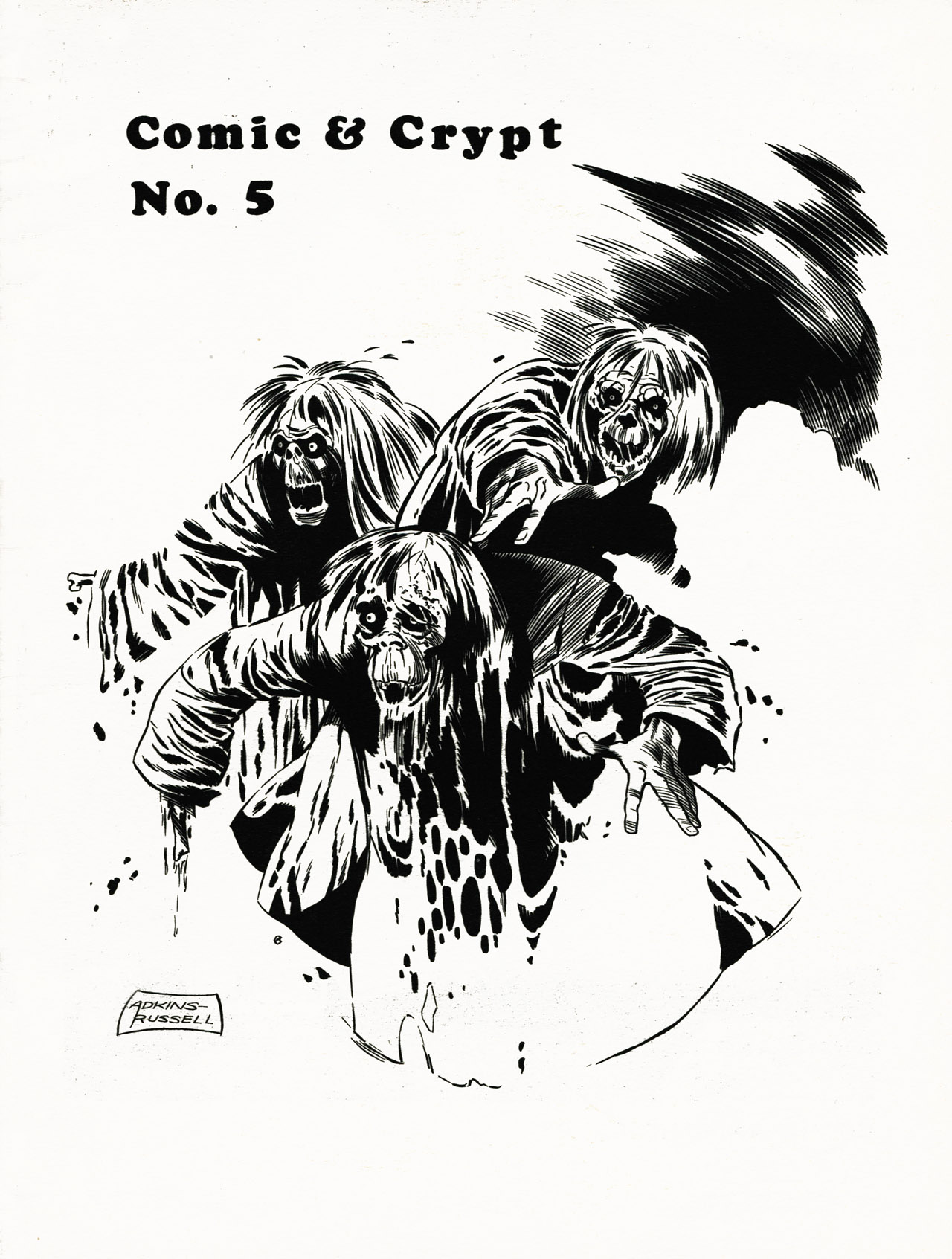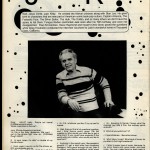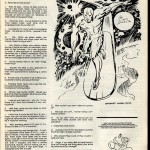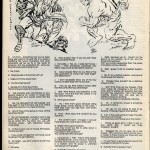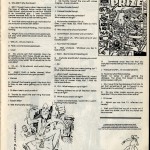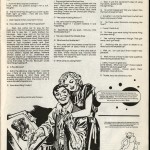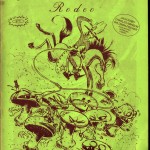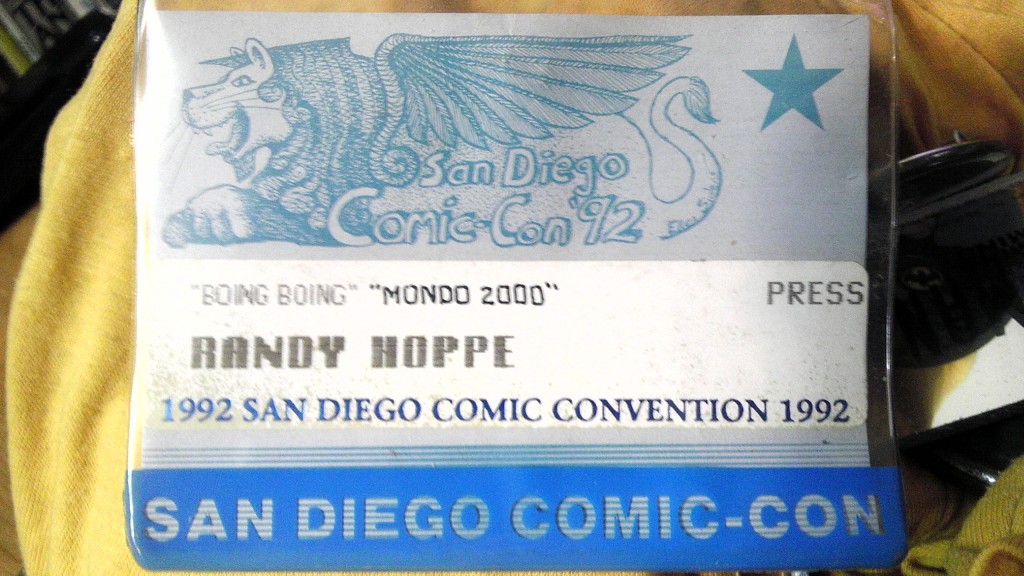Stan Lee & Jack Kirby interviewed by Mike Hodel on WBAI FM, NYC
The audio of this interview is courtesy of Stan Lee Papers, Box 70, American Heritage Center, University of Wyoming. Transcribed by the Kirby Museum.
Hodel: Who goes around saving maidens, preventing banks from being robbed and committing other deeds of that type under an alter ego for the name Peter Parker. How about Tony Stark? Would you believe Reed Richards? Stan Lee? Jack Kirby?
Well, except for the last two, they’re all superheroes and they belong in Marvel Comics and they are written and drawn by Stan Lee and Jack Kirby. And Mr. Lee and Mr. Kirby are gonna be asked some questions about their superheroes. And I guess the first one would be addressed to Stan Lee and it’s the title of this program.
Stan, will success spoil Spider-man?
Lee: (laughs) Oh, I don’t think anything could spoil old Spidey, as we lovingly call him.
I just have to correct one thing you said though. You said that, um, except for Stan Lee and Jack Kirby, the others are superheros. We like to think of (laughs) ourselves as superheros too. Might add also, there are other artists and other writers who do some of the other books too. Jack and I don’t do them all. Although, we- we do the Fantastic Four and Thor.
And, uh, Spider-man has been a success since he started and, uh, luckily I don’t think he’s been spoiled yet so we just have our fingers crossed.
Hodel: I ran across Marvel Comic Books about six or eight months ago and one of the things that drew me to Marvel Comic Books, and Spider-man in particular, is a panel which showed Spider-man swooping down on some bank robbers and they say, “Whoops. Here comes Spider-man.” And he replies, “Who were you expecting? Vice President Humphrey?” Now this is not a line you expect to find in a comic book and it sort of symbolizes your whole approach to the field, which is offbeat and interesting. Was it your idea, Stan, or, well, where did it come from?
Lee: Well, uh, I guess, in that sense it was my idea, since I write the dialogue.
Uh. In a nutshell, our theory is, although maybe I shouldn’t, uh, give the theory in a nutshell, ’cause then I don’t know what we’ll talk about for the rest of the half hour. At any rate, in a nutshell, our theory is that, um, there’s no reason why a comic magazine couldn’t be as realistic and as well written and drawn as any other type of, uh, literature.
We try to write these things so that characters speak the way a character would speak in a well-written movie, well-produced television show. And, um, I think that’s what makes our books seem unique to a person who first picks them up. Nobody expects, as you say, that sort of thing in a comic book, but that’s a shame because why shouldn’t someone expect reasonable and realistic dialogue in a comic book? Why do people feel that comic books have to be badly written, you see? And we’re trying to, um, engage in a one-company crusade to see to it that they’re not badly written.
Hodel: Jack, you drew and invented, if I’m not mistaken, Captain America, one of the earliest superheros, who’s now plying his trade in Marvel Comics. How did Captain America come to be and does he have any particular, oh, relationship to the, to your other superheros?
Kirby: Well, yes, Captain America, like all the characters come to be because it- because of the fact that there is a need for them. Somebody needed Captain America, just as the public needed Superman. When Superman came on the scene, the public was ready for him and they took him. And so, from Superman, uh, who didn’t exactly satiate the public’s need for the superhero, um, uh, soon spawned the rest of them. The rest of them all came from Superman and they all had various names and various backgrounds and, uh- uh, they embraced various creeds.
And Captain America came from the need for a patriotic character because the times at that time were in a patriotic stir. The war was coming on and, uh, to coin a cliché, the war clouds were gathering and the drums were beginning to beat and, uh, the American flag was beginning to show on the movie screens. And so Captain America had to come into existence and it was just my good fortune to, uh- uh, be there at the time when we were asked to create, uh, superheros for the magazines that were coming into creation then, for the new magazines.
Hodel: Well, Captain America fought valiantly against the Axis from 1940 until after the war, then what happened? When did he, uh, die off or go into hiding until he was revived by Marvel Comics?
Kirby: Well, I- I believe that Captain America went into hiding like all ex-soldiers. I know I went into hiding. I didn’t show my face for quite a few years. In fact, I went out to Long Island with my wife and I got happily lost there and never found my way back to Manhattan.
And so, uh, feeling that I- I, myself and Captain America because of the fact that his feelings are mine when the drawings- when- when the drawings are created and, uh, because his reactions are my reactions to this specific situations in the story, uh, well, I have no compunction to say that we both were hiding for all these years and, uh- uh, were quite happy about it.
Hodel: Well, now that Captain America is back in the fight, has there been any talk about sending him to Vietnam? They could certainly use him.
Kirby: Well, that’s Stan Lee’s department and, uh, he can answer that. The editor always has the last word on that.
Lee: Well, the Secretary of Defense and myself just haven’t yet made up our mind. (laughs). Um. I don’t know. I don’t think we’ll be sending him to Vietnam really because, um, it’s a funny thing. We treat these characters sort of tongue and cheek and we get a lot of laughs out of them. We have a lot of fun with them. I somehow don’t know if it’s in really in good taste to take something as serious as the situation in Vietnam and, uh, put a character like Captain America … We- we would have to start treating him differently and take the whole thing very seriously, which we’re not prepared to do.
The time that Jack talks about, when Captain America was first created, the books were written a little bit differently then. There was really, there wasn’t this type of subtle humor. The stories were very serious and at that time, I think it was okay to have Captain America fighting the Nazis and so forth, ’cause they were done very seriously. But right now, I- I don’t think I’d feel right, uh, writing the stories about Vietnam.
Hodel: All these superheroes are, not all of them, but many of them have, uh, hangups. You have one superhero who is blind, uh, named Daredevil, otherwise known as Matt Murdock. You have Spider-man, Peter Parker, who is perhaps the most guilt-ridden teenager I have ever run across. And there are, uh, many others. How did you decide that these were gonna be something more than superheros, that they were gonna have problems of their own?
Lee: Well, it was just the idea of trying to make them realistic, as we mentioned before, trying to write them a little bit better. It seems to me that the best type of story is the type of story a reader can relate to. The average superhero published by some of the other companies, you can’t really relate to them because they’re living in a vacuum. They just have a super power. They can fly through the air or whatever and that’s it, but other than that, they are two dimensional.
Now in order to make a person three dimensional, he has to have a family life, he has to have personal problems and so forth. The thing, I’ve said this so often that it’s almost becoming a cliché with me, but what we try to do is we know that these superhero stories are really fairy tales. They are fairy tales for older people. We think of them that way. We don’t really write them for young kids. And, uh, what we ask the reader to do, and hope he will do, is accept the basic premise, the basic fairy-tale quality, such as the fact that Spider-man does have the proportionate strength of a spider, if a spider were his size and that Spider-man does have the ability to cling to walls, which obviously nobody does.
However, once we accept that basic premise, that fairy-tale quality, we try to make everything else very realistic. The idea being, what would a real person do? How would he react? How would his life be if he had the strength, proportionate strength of a spider and could cling to walls? Wouldn’t he still have sinus trouble? Possibly trouble with girls? A- a- a sick relative that he was worried about? Have to worry about his school marks and so forth?
So once we get beyond the fairy-tale quality, we try to write realistic stories. We try to have the character speaking in a realistic way. To me, I- I feel that this gives it a great deal of interest. You have the combination of the fantasy, mixed with the most realistic story you can get and, uh … Well, we found sort of a winning combination.
Kirby: Well, a prize fighter can win the championship of the world and go home and be very inadequate at home, uh, inadequate enough and have a lot of family trouble.
Hodel: Which may be one reason for his fighting.
Lee: (laughs) Very good.
Hodel: You’ve also created something unique in comic books that I know of. You’ve come up with an anti-hero. A physicist by the name of Bruce Banner, who periodically becomes the Hulk and, uh, oh, he destroys things a lot, as somebody said to me. Uh. What made you think that an anti-hero, who goes around tearing down bridges and buildings and things like that, uh, could sell comic books?
Lee: Gee I- I, actually, it … I think we knew when we started that he could sell comic books better than anybody. We’ve always found … I don’t think it’s that we’re this brilliant. Don’t be … We’ve had so much experience, that we’d have to be stupid not to have learned by all these years of experience and we get a lot of fan mail and you learn a lot by what the readers write. And we learned the villains are usually at least as popular as the heroes are. They have a great appeal.
Kirby: Well, what makes you think that a Boris Karloff can’t be a great star in movies? It’s the same analogy I imagine.
Lee: Right.
And what happens is, after a while, we have a lot of trouble by trying to humanize our heroes and giving them faults and failings, we do the same with our villains. We try to give them understandable qualities and reasons why they are the way they are. We’ve even had villains who reformed and became heroes. One standing joke among our readers and among the artists and writers who work for us, our so-called bullpen, is after a while, we don’t know who the heroes and who the villains are. There’s such a fine line, you see, dividing them.
Well, when we started with the Hulk, we just knew he had to be popular because he had everything in his favor. It had the Jekyll and Hyde format. It had the idea of a monster who was sympathetic, the way Frankenstein really had been in the first movie. He wasn’t bad, Frankenstein’s monster, that is, he wasn’t bad, he was misunderstood. All he wanted to do was be left alone.
I would have bet my bottom dollar the Hulk would have to be well received and he was and he still is one of our most popular characters, probably the most popular one with our college readers, college-age readers.
Hodel: That’s what I was gonna ask. You say your books are aimed not at children, but at, uh, young people and adults. Is there anyway that you can check for magazine sales and so forth as to, uh, what your readership is?
Lee: No. Our only check really is through the mail, which is a very good check because we get thousands of letters a week. I would guess we get almost as much mail as the Beatles and we don’t even sing.
And, uh, by reading all this mail, a monumental task in itself, we’ve learned a lot about who our readers are and what they like and dislike. And, uh, almost half of our mail is from college students and college-aged people.
Hodel: What do they like and what do they not like?
Lee: Just what you’d think they’d like. They like whatever we do that seems to be original, unexpected. They like the, uh, degree of satire we put into the books. They are mad for the quality of artwork, which I think is far superior than has ever been presented in any other comics over the years. They like the, uh, realism, which, uh, it’s always a difficult thing to say because somebody who isn’t familiar with the books would think this guy must be, must have flipped. He’s talking about comic books and he’s talking about realism, but the readers know what we mean. And, um, they like whatever quality they find: good writing, good drawing, good editing, and sincerity. I think they- they can detect a note of sincerity, even though the stories have some humor, quite a bit of humor to them, there is an underlying sincerity. We take them seriously and I think the readers are aware of this.
Hodel: Did you also innovate the letters page, which, uh, it- it- it adds to your stories and frequently I sometimes find in the blurbs you run, that, uh, you advance the stories by means of these letter pages?
Lee: The letters pages are our most successful, one of our most successful devices. It also establishes a rapport, uh, between ourselves and the readers and, uh, I’m happy to say most of our readers feel that we’re all friends. When they write a letter, they don’t say dear editor, they say dear Stan and Jack. Dear so and so. They call us by name and we give ourselves nicknames. We started this as a gag and they’ve caught on. Uh. The fellow here at my right isn’t just Jack Kirby, he’s “Jolly Jack” or-
Kirby: And I’ll get you for it.
Lee: (laughs) … or Jack “King” Kirby.
Kirby: (laughs)
Lee: And I’m “Smiling Stan.” And, uh, this is kinda cute too because, as- as I mentioned to you earlier, I think before we were on the air, we sort of think of the whole thing as one big advertising campaign with slogans and mottos and catch phrases and things that the reader can identify with. And besides just presenting stories, we try to make the reader think he’s part of an in group. A fact that we’ve discussed before, we’re always a little worried about being too successful, where, uh, the readers will feel oh gosh, now everybody’s got on to it. We have to find something new.
Hodel: Is there a real Irving Forbush?
Lee: Oh, I don’t think that it would be right for me to answer that.
Hodel: (laughs)
Lee: When we’re off the air, I might hint at it. He’s real in our imagination, I’ll put it that way. (laughs).
Hodel: Well, I think you’ve also pioneered the use of mythological superheroes. I’m talking about Thor, which you two-
Lee: Oh.
Hodel: … come up with every month.
Lee: Well, you’ve got the right guy here ’cause I would say that Jack is the greatest mythological creator in the world. Well, we- we kicked Thor around and we came out with him. And I thought he would just be another book. And I think that Jack has turned him into one of the greatest, uh, fictional characters there are.
In fact, I should let Jack say this, but just on the chance that he won’t. He was … Somebody was asking him how he gets his authenticity in the costumes and everything. And I think a priceless answer Jack said was, “They’re not authentic. If they were authentic, they wouldn’t be authentic enough.” But he draws them the way they should be, not the way they were.
Hodel: Did you do a lot of homework on that, a lot of, uh, Norse myths and so forth?
Kirby: Well, uh- uh, not homework in the sense that I- I went home one night and I really concentrated on it. All through the years, certainly I’ve had uh- uh, a kind of affection for any mythological type of character and, uh, my conception of what they should look like and, uh, here Stan gave me the opportunity to draw one and I wasn’t gonna draw back from really letting myself go, so I did. And, uh, like, uh- uh, the world became a stage for me there and, uh, I had a costume department that really went to work. And, uh, I gave the Norse, uh, characters twists that they never had in anybody’s imagination.
Lee: (laughs)
Kirby: And, uh, somehow it- it turned out to be a lot of fun and I- I really enjoyed doing it.
Hodel: Isn’t it rather tough to come up with villains that, uh, are a suitable match for a Norse god?
Kirby: Well, not if they’re Norse gods.
Lee: (laughs).
Hodel: Well, you’ve also dragged in some Greeks. I remember one epic battle with Hercules.
Kirby: Well, Hercules had, uh, Olympian powers, which certainly are, uh, considered, uh, on an equal basis with old powers of the Norse gods and, uh, therefore we, uh, we felt that, uh, they were an equal match for each other, and by rights, they should contend with each other.
Lee: These college kids, who are so hooked on these stories, and they like Thor also, and not long ago I was speaking at Princeton, and one of the questions that I was asked was, “How do we reconcile the idea of Norse gods and Greek gods in the same story?” Now, obviously, Zeus and Odin are really the same god, but, uh, in different mythologies. And it occurred to us, what we do is we create our own mythology and we create our own universes and in our minds, there is an Olympus and there is an Asgard and Odin is the boss of his little god- god-dom and Olympus is the chief of his and we may someday bring in the Roman gods or whoever else.
And we figure that we don’t have, as Jack said, we don’t have to be that accurate because we think we can do better. After all, mythology is mythology and who’s to say we can’t make up our own myths, which is what we’re doing, just basing them on other past ones and having a heck of a good time doing it.
Hodel: Well, you have to draw your villains to scale. You can’t give Spider-man and, uh, Thor the same villain to fight. You, there has to sort of a class A, B, and C for villains. And, uh, so it must be a bid of a hard- hardship to come up with a villain who can be, uh, satisfactorily, uh, well give satisfactory battles-
Lee: Yeah.
Hodel: … to Thor.
Kirby: Yes. Well, I found out that villains seem to have their limits to because I came up with a few on a- on a galactic scale and-
Lee: (laughs)
Kirby: … and soon reversed my direction. (laughs)
Lee: The trouble with Jack is he’s too darned imaginative and he- he gets himself absolutely trapped. The last thing he did and finally we both said we have to stop and retrench a little, is he had Thor fighting a whole planet. Jack came up with an idea, a fella named Ego, who’s a living planet in … What was he, a bio, instead of a universe?
Kirby: Yes. He lived in a- a bio-verse. And, uh-
Lee: Which I’m sure we’re all very familiar with.
Kirby: Yes, and- and-(laughs)
Hodel: Just the other side of the, uh, negative universe, right?
Kirby: Yes. And- and- and just not presenting the reader with a- with a living planet. We- we- we had, it had to be cause and effect, so we made him into a multiple virus, which we felt (laughs) could be accepted and that maybe not on a friendly basis-
Hodel: (laughs)
Lee: (laughs)
Kirby: … but certainly on a realistic basis and that was our jumping off point. And, uh, we went on from there and he was acceptable to the reader, uh, due to the fact that he could contend with Thor on Thor’s level.
Lee: He was acceptable due to the fact that Jack drew him so well, but the problem was where do we go from there. After you fought a living planet, you can’t fight a litter bug. So, uh, we- we do have problems in that respect.
Now we have to, we’re trying to humanize these characters again a little bit, because they’ve been too far out, you know, there. We had him fight the whole troll empire in Asgard. And he fought … Well, we, in the Fantastic Four, for example, we had a fella name Galactus, who’s practically god. I mean, he could do anything and he, uh … We- we realized after Galactus, that we better take it a little bit easy with these villains too.
In fact, a lot of readers would write in and they say, “Well, where do you go from here? Well, who’s he gonna fight next after that?”
Kirby: Not only that, we felt it was disrespectful to Galactus to even destroy him in any manner, so we had to just respectfully find a way for him to leave and then go on to another adventure, because we couldn’t even touch him, I believe. And, uh, there- there might have been an outcry if we had.
Lee: (laughs) One other thing I think that we’ve innovated that has been pretty successful, is overlapping characters and books. For example, this Galactus, he first appeared in the Fantastic Four. Now this is interesting to me, the Fantastic Four books that he appeared in were three in number, three consecutive issues. We have continued stories. In fact, they are, all our books are one big continued story. And in the mail we received from so many college kids, they now refer to those books, they’ll say, “By the way, regarding your Gallacks- your Galactus trilogy” … and the darned thing, you know, they’re referring to this as though it’s the rise and fall of the Roman Empire, which I love. This is wonderful. It means we’re- we’re really reaching them.
At any rate, he appeared in the Fantastic Four and then he went off to another universe and that was the end of Galactus, but we didn’t leave him there. In Thor, which is another publication of ours and has no relationship to the Fantastic Four except that we publish them both, what we did was, when Thor was finishing of this living planet that he had battled, on his way back to Earth, he passed Galactus, who was wandering around in the sky up there, and Galactus was on his way to meet the fellow, Ego, who was the living planet and so forth, and we just kind of left it there. And someday when we run out of plots, we’ll have the fight between Galactus and Ego. But we very often do that ’cause we feel it gives a feeling of realism also.
If we have a villain who fought the Fantastic Four or Spider-man or Daredevil or the X-Men or Captain America or whomever, why shouldn’t he eventually meet another one of our heroes? Or why shouldn’t our heroes meet as they often do and guest star in each other’s book? Because according to the gospel as preached by Marvel, they all live in the same world, you see?
Kirby: I would advise any astronomer listening to what we have to say here to take another good hard look at the Quasars-
Lee: (laughs)
Kirby: … because we think that one of them is Galactus.
Lee: (laughs)
Hodel: (laughs)
Lee: And we dare them to disprove it.
Hodel: If anyone wants to disprove it, please call WBAI and we’ll set up a program.
I wanted to talk about your guest-starring villains and superheroes in, uh, in each other’s books. Do you find that this, well, besides giving continuity and realism, do you think that, uh, to save you the trouble of creating more villains?
Lee: Oh, it certainly is helpful because once, it’s like a- a repertory theater, where you got your actors, and you know what they can do, and you can use them as- as needed.
Once we have our cast of characters, whether heroes or villains or both, it makes it easier for us to base stories. If we’re sitting around dreaming up a plot, Jack might say to me, gee, you know, we haven’t used the Silver Surfer for awhile. How would it be if he was doing this, that, or the other. Or I might remember, gee, what about Galactus or- or whoever, so it does make it easier.
But that isn’t the reason we do it, we do it because again, it seems to me that you enjoy things that you’re familiar with and the readers eventually get to know these characters and they’re interested in these characters and why just get rid of them. It’s very, it takes months to build up that interest in a new character.
So what we do is, while we’re developing a new character, we’ll still have old ones reappearing to give a- a- a thread of continuity here and there. In fact, in the Fantastic Four, we have absolutely gotten ourselves into such a hole, that I don’t know if we’re ever gonna get … We have so many continuing characters that Peyton Place seems simple next to our situation.
Hodel: I walked into the Fantastic Four line about three or four months ago and every couple of pages you drop one of the Fantastic Four, The Human Torch, Johnny Storm, uh, he will appear for a moment and then he will go off someplace, looking for the Inhumans, for a- for a girl. And, uh, I’m very curious to know where the Inhumans first popped up? It looks as if you, uh, had an idea for a hero there in Black Bolt, who’s the leader of the Inhumans, I found out in I think one of the Avenger books, of all places.
Lee: (laughs)
Hodel: And, uh, they sort of weave in and out over a period of, well, must be at least a year now. And, uh, that must-
Lee: These things aren’t always planned. They grow.
Now what happened was, I think Jack, the first Inhuman that we brought in was Gorgon, wasn’t it? Didn’t we have a story, the gentleman’s name was Gorgon?
Kirby: Yes.
Lee: And he was a fella who (laughs) he looked a little like a centaur or something. He could kick his foot very hard and he had great power. He could shatter a mountain by kicking his foot. He started out as a villain. We liked him so much, I should say Jack liked him so much, that he kept using him. We figured he has to come from somewhere. We decided, let him come from some strange land over in Europe, where there are a whole group of people like him. And well, what else could you call them except the Inhumans. Then Jack had to create a whole bunch of Inhumans and I think he did a great job. All these characters are really very imaginative.
When it came to doing the leader, we decided, well, there was no need for them all to be villainous. And you’re right, I think we did have in mind that Black Bolt would eventually be a heroic type.
And again, we always try to give a character a hangup so his hangup is he doesn’t speak. Now, I’m quite sure he’s the first non-speaking superhero or supervillain, we don’t know quite yet in history.
But anyway, they evolved. I mean, we didn’t sit down one day and say let’s do a group of Inhumans and these are their names and we’ll present them in this fashion, as with everything we do. We just sort of stumble into them as we go along.
I might add something that you may not be aware of, we don’t do the stories the way most other outfits do. We kick around a plot very, very loosely and generally for a story, just discuss it for a few minutes. Uh. We might say- say Jack, and I’d say Jack, in the next Thor, how about bringing back Galactus fighting the planet Ego or something. And Jack will say great. And off he goes. I don’t know where he goes, but off he goes. I don’t see him for a week. He comes back a week later and the whole strip is drawn. And nobody knows what I’m gonna see on those pages. He may have come up with a dozen new ideas, you see. It’ll have something to do with Galactus and Ego. And I take it and I write it on the basis of what Jack has drawn. He’s broken it down to continuity for me. He’s drawn the whole thing actually. I put in the dialogue and the captions. So he doesn’t know exactly what I’m gonna write, what words I’m gonna put in their mouths. I don’t know what he’s gonna draw. The whole thing is, uh, virtual chaos. But somehow, when it gets together, it- it seems to hold together pretty well. We- we kind of like working this way.
Hodel: Well, my own favorite book is the Avengers. Uh. I guess, I have a hangup over a group of superheros, rather than individuals. And each one of the Avengers, which have, which number six, and I believe the, uh, official count is eight, although I gather they’re changing. You’re-
Lee: Always.
Hodel: … bringing some new ones in.
I remember in one book that you toyed with the idea of making Spider-man an Avenger and then decided no. We better not. He works best alone.
When you start out with, uh, well, with the Avengers, sometimes do they get ahead of you?
Lee: Oh, I’d say all the characters get ahead of us. I sometimes think they write their own stories.
Lee: Uh. The Avengers, we have almost the same problem as Jack has with the Fantastic Four. There are so many of them and they all have so many of their own problems. And we have another fellow writing that now, Roy Thomas, who’s just been added to our writing staff recently. And, uh, (laughs) I don’t know how the poor guy is doing it. I- I got out of the Avengers when it began to get complicated and Roy inherited them. There are now a million more characters there than there ever were when I wrote the book. In fact, I can’t even keep track. If you say there are eight, I’ll take your word for that. I thought they were at (laughs) 35 by now.
Lee: Every character we have, when we don’t know what to do with them, we throw them into the Avengers.
Kirby: Not only that, we have to make sure, I’m sorry, we have to make sure that they’re not involved in situations which won’t conflict with the one we want to create at that moment.
Hodel: You took care of one of those very nicely in the newest Avengers strip. I don’t recall the number, but, uh, the subplot concerns getting, I think it’s the Red Witch in..
Lee: Scarlet Witch.
Hodel: The Scarlet Witch-
Lee: The Scarlet Witch. Of course.
Hodel: … into the Avengers and this causes its own hang ups because, uh, unlike most of comic-dom, there are people who don’t like her, don’t think she should be a member of the group.
And, uh, meanwhile, in another book, you have sent Captain America off looking for somebody else. And you tied up one of the loose ends by, uh, in the Avengers. This is getting complicated. (laughs)
Lee: (laughs)
Hodel: By, uh, saying that he was off. It was very nicely done. I was curious when- when he left his post in his own book, which is Strange Tales or Tales of Suspense. I can’t-
Lee: Captain America is in Strange … No. I’m sorry. He’s in Tales of Suspense. Free plug. (laughs)
Kirby: (laugh) This all sounds very familiar.
Lee: (laughs) Strange Tales, since you asked, features Dr. Strange and Nick Fury, Agent of Shield, who also stars in his own book, Sgt. Fury, uh, and His Howling Commandos, which is probably the nuttiest title every conceived of.
Hodel: I wanted to ask you about, uh, Mr. Fury, Sergeant, Colonel-
Lee: Well, he’s in- in Strange Tales, he’s Colonel Nick Fury. Um. I think I can anticipate your question, the fact that he’s in two books, uh, concurrently. What happened was, we put out this war book sort of as a gag a long time ago. When our superheros were doing so well, I mentioned to our publisher, Martin Goodman, that, um, it seems to me we seem to have a formula for these books now and it doesn’t much matter what the subject matter is, as long as they are written and drawn in the style that I think the readers would like them, this, uh, sort of realistic style. I said, to prove it, I bet if we put out a war magazine, which were no great shakes at that time, we could sell just as well and we could make the public like it as well. And, uh, just sort of on a gamble, we did it and we came up with the most unlikely name, Sgt. Fury and his Howling Commandos. I think I was always captivated by the names Screaming Eagles from World War II. This was the closest I could get.
Um. At any rate, we gave them a lot of personality. They weren’t just a bunch of soldiers who fought heroically and that was it. They quarreled among themselves and they had their own … They were a squad. Everything was wrong too. For example, Americans weren’t Commandos during the war, they were Rangers. The English were Commandos. We made them American and we still called them Commandos and they were based in England. And in our usual bumbling way, all the facts were pretty inaccurate, but the characterization was there and they were led by tough, rough and tough sergeant, and nobody can draw rough and tough sergeants better than Jack, who did the first few books, Sgt. Fury, Nick Fury. And there are a lot of other interesting characters with him.
Well, at any rate, uh, the stories took place during World War II. The readers loved them so much that they said, why don’t you have stories of … What’s Sgt. Fury … They- they began to think he was a real person. What is Sgt. Fury doing today? That was 25 years ago. Is he alive today? What’s he doing? Why don’t you have a book of Sgt. Fury in the vet-, in the Vietnamese war today and so forth?
I didn’t want to put him in the Vietnamese war, but at that time the James Bond things were popular and we figured it might be very logical for Fury to be a, um, in intelligence or a counter spy or something of the sort. Not that logical ’cause he’s a very, um, rough and tough, hard-bitten guy without nearly the polish of your average secret operative, which also is typical of the way we do things. He’d be the last guy you would expect to be a debonair head of a secret organization, so we made him Colonel Fury, the Head of S.H.I.E.L.D, which is like any of these others, like U.N.C.L.E. or anything else.
So we now have stories of Sgt. Fury in World War II and the same fellow today as Colonel Fury, the Head of S.H.I.E.L.D.
Hodel: Do you ever get an overwhelming impulse to kill off the Sergeant and let them wonder how the Colonel got there?
Lee: You know, I never thought of that, but (laughs) that’s a very, very good point. That would drive everybody crazy. (laughs).
Kirby: It’s like having your own grandmother. Killing your own grandmother. I’m sorry.
Hodel: Do, uh, do your books run in trends or are there plots that run in trends that you have to anticipate or- or try to keep up with?
Lee: This was the case for 25 years, uh, for 20 years before we started with the so-called Marvel Age with comics. In the past, if the war books were selling, we would put out war books and we’d sell our share. If the, uh, crime stories, cops and robbers type of thing, if they were selling, we’d put those out and we’d sell our share and so forth.
Now, fortunately, we seem to feel that we’re creating the trends. Most, I think if we put out a book of romance stories or aviation stories or what have you, we would create a trend in so doing, because we have a loyal following among fandom and as long as we can write them well and draw them well, I don’t think it much matters what the subject matter is, it … And I know there are a lot of people who’ll disagree with me, but I feel the important thing is how well you do it. So we think of ourselves as being the top of the trends right now, instead of just following them.
Hodel: Well, if you’re making the trends, what do you think is gonna be next? Where do you go from here?
Lee: You know, I’m- I’m afraid, I- I could answer it and I daren’t ’cause we are working on a new magazine and if you invite me back here about a month or two from now, I’ll tell you then. But I know, if I mention it and any of the competition hears it, they might just beat us to it. But we do have a new type of magazine that we are working on right now. It should be on sale in about four months.
Hodel: I wanted to ask you, what is the, uh, the time element involved in from, uh, from your and Jack’s idea to the time it hits the stands?
Lee: Well, I’d say from the time Jack and I do a strip, uh, to the time it hits that stand, must be about three and half to four months.
Hodel: What, uh, causes that great a lag, just the mechanics?
Lee: Yeah. The strip comes into the house and it sits around for a while, while it’s proofread and edited. Then it goes out and the photostats are made and the stats are colored for the engraver. Then it’s sent to the comic’s magazine association, where they check it over and make sure that there’s nothing objectionable according to the code of ethics that we have in the industry. Then it goes to the engraver then the mat maker, as far as I know. I don’t know too much about this. I think Jack knows more than I do. Printer and so forth, the distributor and it’s shipped around the country. It’s just a complicated thing. It takes a long time.
Hodel: Does it cost a lot of money? How much per book would you say?
Lee: You know, I’m embarrassed. I have been in the business so long and not to know. But I-
Kirby: I-
Lee: Jack would know. Wait a minute.
Kirby: Higher than it used to be. I- I can’t give you an exact amount, but certainly everything costs more. Uh. A magazine that you put out in 1940 might cost you twice as much to put out today. Cost of paper. Cost of printing and engraving.
But, uh, magazines- magazines are- are doing fairly well in the economy and certainly holding up and, uh- uh, the price of production certainly is, uh- uh, on a level which benefits, uh, from the sales we’re, you know, the magazines are getting so there’s no complaints on that score, not from Marvel, as far as I know.
Hodel: (laughs) Well, and you can sell enough books at 12 cents or 25 cents a piece to, uh, do reasonably well.
Lee: Well, we have to sell a lot of them because I think that the profit, you know, on a 12 cent book is just, uh … Again, I don’t know. It may be a penny or two pennies, but it’s something in that area. Most of it goes to the- the printer, the wholesaler, the distributor, the store keeper and so forth, and just a little bit of it trickles back to the publisher. Fortunately, we sell hundreds of thousands of them so, I don’t think there’s too big a problem as far as making a dollar here and there.
Hodel: Before we went on the air, uh, you and Jack were involved in a slight argument over whether Marvel should, uh, remain number two in superheros or you should, uh, take advantage of the fact that you are selling more books than, what shall I say, the other leading publisher.
Lee: Well, I don’t know that we’re selling more. I think they’re printing more cont-, they- they have more books, consequently they more in total volume. I think our percentage of sales is higher. For the books we print, I think we sell more copies of them.
Yes, we- we are having and ar- … The argument in a nutshell, then I’ll let Jack speak his piece, is I feel that I don’t want to lose our image of being the underdogs, which we’ve had for years. The little outfit that came along and we’re, um, challenging the big fellas. The American public being the way it is, once we’re known to be the leaders, they’re liable to sympathize with another outfit. So I’d like us to kind of, uh, have the, it’s not that I don’t want us to be top, but I’d like with the public, I’d like them to think of us as the little, homey, uh, fun outfit that, you know, we’re not quite that and successful. We’re not that fat cat-ish yet.
Lee: Jack feels differently though I think.
Kirby: Well, I feel that we, well certainly, we may be number one but still retain the type of character that we’ve always had. Certainly if people like you at first, there- there’s no reason why they shouldn’t continue to like- like you unless there’s some sort of a radical change in your makeup. If you’re a good magazine, I imagine that they will keep reading it and your readers will be faithful to you.
Certainly, uh, they don’t expect you to, uh, get the arrogance that you might expect with, uh, a champion of any kind. Uh. There, uh, there have been champions that have been humble and that have had fine characters and have been likable. Uh. Certainly, uh, people who’ve had the admiration of the public for years. And there have been champions who have had color and arrogance and have been disliked and, uh, yet have, uh, retained, uh, the quality that have made them champions.
So it doesn’t matter what kind of character the magazines have, the … My- my contention is that it must have the content that the readers like. Uh. Although, the magazine certainly has- has, uh, an individual personality, which Stan has instilled, uh, through his cultivation of the readers. Uh. We still have the content that is superior to any of the magazines on the market and I as a reader would like to read Marvel. And when I do a strip on Marvel, I feel that I’m a reader. I’m certainly never bored with the stuff I read in Marvel. And, uh, I may get to dislike Stan or dislike anybody else in the organization, but that won’t deter me from buying the magazine.
So I feel we are number one. We should be number one, and we say we’re number one and, uh, have no regrets about it. If we’re not number one, we’d like to, I- I feel that we should take, uh, the criticism and, uh, use it for its value. Take whatever value the criticism has and use it for our improvement. It’s as simple as that.
Lee: Well, I think Jack is a real pussy cat to say that and I know what he means and I certainly want us to be number one too and I agree with everything he says. I think the quality should be as good as we can make it and I think the readers will always read our material, if it, uh, what they want to read.
My only feeling is, as I mention, I like to think of this whole thing as an advertising campaign and I just know that the public generally likes an underdog. And while I’m not sure we’ll lose anybody if they think we’ve grown terribly complacent and successful, I think it’s more fun for the reader to think he’s latched on to something that is sort of his little discovery and, um, it’s a little bit far out and the general public hasn’t quite discovered it yet and he can tell his friends about it. But the minute the reader feels everybody knows about Marvel and everybody likes Marvel, then I’m just afraid, while they’ll still read us, but as far as their sympathies are concerned, they may try to find something else that nobody has discovered yet-
Kirby: Well, I-
Lee: … to lavish their affection on.
Kirby: I think what the reader does not like is false humility. The reader by this time knows that Marvel is number one. He knows that Marvel is superior. He knows that Marvel has quite a number of readers.
Lee: (laughs)
Kirby: And if we were to tell them, that we are humble and, uh, that we’re not quite number one, he won’t believe it.
Lee: No. I don’t mean-
Kirby: He will not believe it.
Lee: I don’t mean tell him. I think the one thing we have never been accused of is humility, whether false or otherwise, because our readers figure we’re the most conceited group in the world and they get a kick out of it because we’re always bragging.
Kirby: That’s too true.
Lee: We call ourselves Marvel, the House of Ideas.
Kirby: (laughs)
Lee: We have phrases like “Who says this isn’t the Marvel Age of comics?” and they’re always writing letters to us, “You guys may be the most swell-headed guys in the world, but you gotta right to be and we still love you.” I don’t-
Kirby: And there you are. (laughs)
Lee: I’m not talking about humility, I’m talking about the fact that I think it would be better for us if the reader does not think of us as being on top of the heap, as far as being a rich, successful outfit. And I might be dead wrong, but then I don’t know that that’s the image I think I’d like the public to have of us.
Hodel: You’ve been listening to two of the most humble-
Lee: (laughs)Hodel: … and feared underdogs in the number one spot in the comic business, Jack Kirby and Stan Lee of Marvel Comics and, uh, this is Mike Hodel for WBAI.


